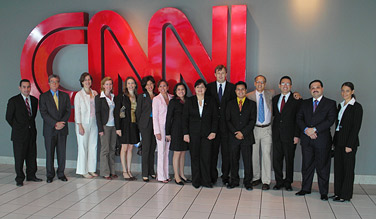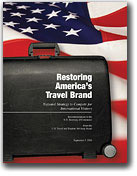|
|
|
||||||||
|
Short Takes: News from the International Trade Administration Commerce Department Ruling Finds China Still a Non-market Economy China remains a non-market economy (NME) for purposes of investigating certain trade disputes, according to the comprehensive analysis of China’s market economy status released by the U.S. Department of Commerce in August. China has been considered an NME under U.S. antidumping law since the early 1980s, when the first antidumping investigations involving it were concluded. The most recent decision was prompted by a request from a Chinese company involved in an antidumping investigation of certain lined paper products (such as school notebooks) that the department review China’s NME status. An NME is defined by U.S. law as any country that the Commerce Department determines “does not operate on market principles of cost or pricing structures, so that sales of merchandise in such country do not reflect the fair value of the merchandise.” In its decision, the department noted that although China has enacted significant and sustained economic reforms, market forces are not yet sufficiently developed to permit the use of prices and costs for purposes of the department’s dumping analysis. As a result, the department will continue to use a methodology based on prices and costs from an economically comparable third country when determining whether a Chinese company has “dumped” their products in the United States. The continued designation of China as an NME applies only to U.S. trade remedy proceedings, and it in no way affects other aspects of our bilateral trade relationship. The decision, as well as a fact sheet on the decision, are available on the Internet. Business Ethics Training Program Welcomes Latin American Partners This summer, the Department of Commerce welcomed 12 visitors from six Latin American countries to participate in a three-week workshop on teaching business ethics to people in their home countries. This “Train the Trainer” program was sponsored by the International Trade Administration’s Good Governance program. Sessions were held in Washington, D.C., and Atlanta, Georgia, from July 17 to August 4, 2006. Participants included two private-sector leaders from each of the six Latin American countries in which the Good Governance program operates: El Salvador, Guatemala, Honduras, Nicaragua, Panama, and Paraguay. (Story continues below.)
The Good Governance program was started in Russia in 1998 to promote business ethics and transparency. Programs are now active in 14 countries in Latin America, as well as in the newly independent states and Eastern Europe. In each participating country, the program works with private-sector groups to build awareness of international standards of business conduct. During this summer’s program, trainees learned how to design an ethics program for a business or organization, which included instruction on how to write a code of conduct, how to communicate that code internally and externally, and how to effectively solicit and respond to employee and stakeholder concerns and feedback. The program included outside speakers and company site visits to learn how real companies have structured their ethics programs. The training was led by a team of business ethics experts that included Anita Baker, former manager of the World Bank’s Office of Business Ethics, and Lori Tansey-Martens, president of the International Business Ethics Institute. Trainees hailed from local small and medium-sized businesses, local branches of large multinationals, private law and consulting firms, the Panama Canal Authority, the University of Rafael Landívar in Guatemala, local American chambers of commerce, and other business associations. The trainees are now back home and have already begun planning business ethics workshops. For more information about the Good Governance program, visit its Web site.
Tourism Board Urges National Strategy to Compete for World Tourism
The report’s recommendations focus on three areas: (1) making it easier for people to visit, (2) creating a nationally coordinated marketing plan, and (3) measuring the economic effect of the travel and tourism industry. The U.S. Travel and Tourism Advisory Board consists of 14 executives from prominent travel and tourism businesses and organizations. Secretary of Commerce Gutierrez formed the board in late 2005 and charged it with the task of developing, creating, and implementing a national tourism strategy. At the board’s first meeting in January 2006, Gutierrez specifically asked the board to recommend a new strategy for competing in the international tourism and travel market. Copies of Restoring America’s Travel Brand are available on the Internet. New Foreign Trade Zone Rules Announced; New Zone Opens in Michigan Recently announced changes in how foreign trade zones (FTZs) operate and the opening of an entirely new FTZ subzone in Michigan will bring benefits to U.S. manufacturers as they compete in the world marketplace. On September 18, 2006, at a meeting of the National Association of Foreign Trade Zones in Orlando, Florida, David Spooner, assistant secretary of commerce for import administration, announced two significant changes to streamline FTZ operations. First, FTZ manufacturing applications will be processed more quickly—in 6 to 8 months—instead of the 12 months allowed under regulations. Second, FTZs will adopt a more flexible approach for granting so-called temporary or interim manufacturing (TIM) authority. This new approach means that TIM authority will be possible for products and components that are similar, rather than identical, to previously approved FTZ applications. TIM applications are normally processed within 90 days. On October 2, 2006, Spooner announced the approval of an entirely new FTZ subzone in Portage, Michigan. The subzone, sponsored by an existing FTZ in Battle Creek, Michigan, will serve Pfizer Inc. Pfizer’s manufacturing facility in Portage employs about 3,900 employees and exports about 35 percent of its production, which is valued at approximately $630 million annually. The new subzone will allow Pfizer to better compete with manufacturing plants overseas by giving the company access to the same U.S. duty treatment on its products as would be given to facilities manufacturing abroad. FTZs are locally sponsored sites, approved by the U.S. Foreign-Trade Zones Board, where special customs procedures can be used. U.S. manufacturers can operate within existing FTZ sites or, if necessary, ask their local FTZ to sponsor an extension of the zone at the manufacturer's facility. For more information about FTZs, visit www.trade.gov/ftz.
|
|

 A newly issued report from the U.S. Travel and Tourism Advisory Board, Restoring America’s Travel Brand: A National Strategy to Compete for International Visitors, calls for a new national strategy to compete for a greater share of the growing tourism market. “Encouraging more people to visit the United States is in the national interest—not only because it will create jobs and revenue, but because it will have a positive impact on how people perceive us,” said Jay Rasulo, chairman of the advisory board and chairman of Walt Disney Parks and Resorts. “Secretary [Carlos M.] Gutierrez has challenged the industry to apply its best thinking toward how to achieve this goal, and we are pleased to provide him with our recommendations.”
A newly issued report from the U.S. Travel and Tourism Advisory Board, Restoring America’s Travel Brand: A National Strategy to Compete for International Visitors, calls for a new national strategy to compete for a greater share of the growing tourism market. “Encouraging more people to visit the United States is in the national interest—not only because it will create jobs and revenue, but because it will have a positive impact on how people perceive us,” said Jay Rasulo, chairman of the advisory board and chairman of Walt Disney Parks and Resorts. “Secretary [Carlos M.] Gutierrez has challenged the industry to apply its best thinking toward how to achieve this goal, and we are pleased to provide him with our recommendations.”